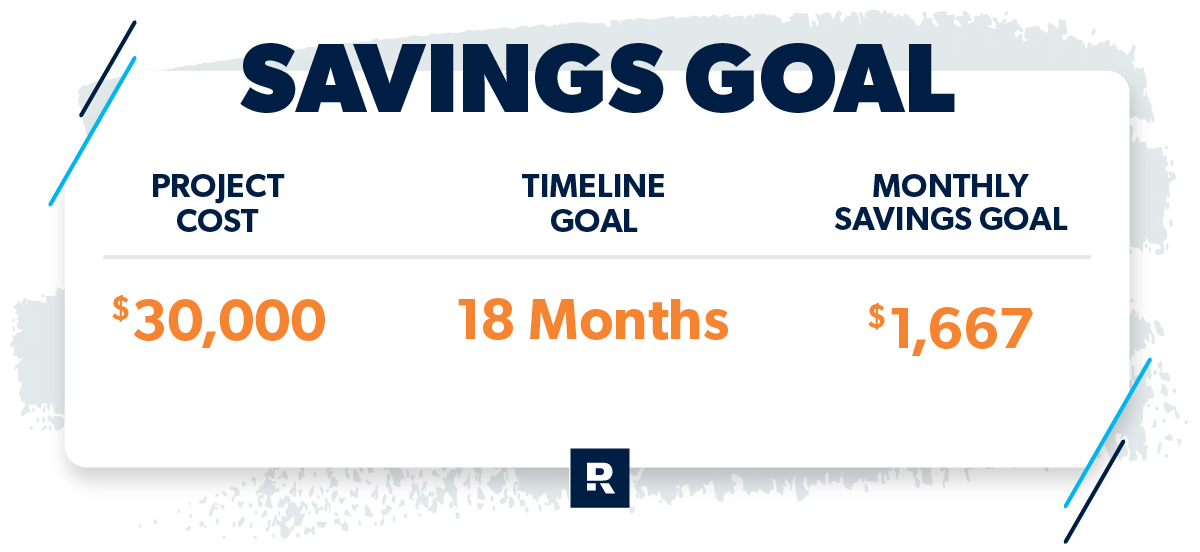So, you’re getting set for a home renovation project. That’s exciting! But you need to be careful. Why? Because it can be really easy for the cost of renovating your house to get out of control.
All the time, folks plan something small, like installing a new kitchen floor. But then—the new floor clashes with the cabinets, so they decide to update those too. While they’re at it, they figure they might as well add a gorgeous kitchen island. And before they know it, that $2,000 renovation project they had in mind spikes up to $20,000—yikes!
To make sure you don’t wind up going down that path, you’ve got to have a plan. That means before you bust out the power tools, you need to create a home renovation budget so your financial goals stay intact.
Here’s how you can do just that in four easy steps.
How to Make a Home Renovation Budget
Step 1: Pick Your Projects
The first step to making a home renovation budget is choosing which projects you want to tackle. Chances are, you can’t afford to refinish your living room floor, replace your kitchen appliances, redo the tile in your bathroom and give your master bedroom a new paint job. So, it’s time to choose which projects are most important to you.
Which projects should you prioritize? Well, if a room in your home is out of whack—as in it’s not functioning the way it should—that should obviously be priority number one. Or if you have a clear vision for how to update a particular space, go for that one first.
But if things are otherwise even, start with projects that will add value to your home. Think of your renovation project like an investment—you’re trying to get more money out than you put in.
Turns out, several popular home renovations ended up being great investments for homeowners in 2022. For example, homeowners who refinished their wood floor added enough value to their home to recoup their investment, plus an extra 47%. Folks who installed a completely new wood floor also added more value to their home than they spent on the project—18% extra, to be specific.1
Once you pick the projects you want to focus on, stick to them. It can be tempting to add more tasks along the way, but that’s a surefire way to bust your budget and leave you wondering where all the money went.
Step 2: Research the Costs
Bust out that calculator—here comes the fun part!
Now that you’ve decided which renovations to focus on, research the cost of everything that goes into those projects, including all the labor and materials needed. This’ll take some time and effort, so grab a cup of coffee and get cozy at your computer screen.
Keep in mind, you won’t be able to get an exact cost until you talk with actual contractors, but digging around online will give you ballpark figures to help you set a realistic budget.
Find expert agents to help you sell your home.
For example, if you’re looking into a kitchen renovation, you’ll find numbers similar to these when you research the costs:
|
Kitchen Renovation Budget Items |
Percentage of Budget |
Renovation Item Cost |
|
Cabinetry and Hardware |
28% |
$8,400 |
|
Installation and Labor |
18% |
$5,400 |
|
Appliances and Ventilation |
15% |
$4,500 |
|
Countertops |
11% |
$3,300 |
|
Flooring |
7% |
$2,100 |
|
Lighting |
5% |
$1,500 |
|
Walls and Ceilings |
5% |
$1,500 |
|
Windows and Doors |
4% |
$1,200 |
|
Plumbing and Faucets |
3% |
$900 |
|
Design |
3% |
$900 |
|
Other |
1% |
$300 |
|
Total Budget |
100% |
$30,0002 |
Step 3: Set Your Savings Goal
Once you get a ballpark estimate for how much your home renovation project will cost, the next step in making a budget is to set a goal for saving up that amount of money. Because if you want to be smart about paying for your renovation project, cash is the only way to go.
Sure, you’ve probably heard of fancy financing programs like a home equity loan or a home equity line of credit (HELOC), but that means you’d be borrowing money against your house. Yeah, that’s a terrible idea. No renovation is worth the risk of going further into debt—or even potentially losing your home.
That’s why it’s super important to set a savings goal that’ll let you pay for your renovations in cash. How do you do that? It’s simple!
Decide when you want to start your project, then do some math (hooray!) to figure out how much money you’ll need to save each month to make it happen.
Let’s look at an example: If a couple wanted to completely redo their kitchen for the cost we looked at earlier ($30,000) and they wanted to get started on the project in 18 months, here’s what their savings goals would look like:

Once you set your savings goal, it’s time to get to work. It’s one thing to set a savings goal, but it’s another thing to stick to it. So, make sure you’re tracking your income and spending each month to make sure you stay on track with your goal.
For an easy way to do just that, download the EveryDollar app. It’s the best way to keep up with your home renovation budget and track your spending, since the premium version lets you connect your bank account—which means all your transactions will automatically pop up in the app. Super easy!
Step 4: Collect Bids From Contractors
Once you’ve hit your savings goal and you’re ready to get to work on your dream renovation project, the final step of making a home renovation budget is to hire a home contractor—the person who’ll give you an exact price tag for your project and make sure your renovations actually get done.
How do you hire a home contractor? Start by asking around for recommendations or searching online. Try to find at least three legit contractors in your area, then request project bids and timelines from each of them so you can compare pricing.
This isn’t all about going with the lowest bid, though. Cheaper isn’t always better if you wind up with a shady contractor who takes several lunch breaks a day and leaves you with a half-finished project. Do your research on potential contractors by checking their insurances and certifications, contacting references and interviewing them yourself.
Once you find a contractor you can trust who fits your price range, bring them on board! When you get to that point, the process of making your home renovation budget will be complete. That doesn’t mean the work is done, though. You’ll also have to make sure you stick to your budget.
As your project moves ahead, you’ll need to make sure you’re not going over budget on items like appliances, tiling and flooring. Your contractor could also find a problem along the way (like a leak or structural damage) that needs to be fixed—which could mean you need to adjust your plans. You may have to spend some of the money you budgeted to address those issues and cut back on how much you put toward the pretty stuff.
But if something unexpected does pop up, you’ll be prepared because you did all the hard work of budgeting on the front end.
How Much Does It Cost to Renovate a House?
The typical cost to renovate a home is around $10–60 per square foot. So if you renovated a 130-square-foot room, it would cost somewhere between $1,300 and $7,800.3
That might seem like a pretty big range, but the cost of your renovation will depend on the project you tackle, how much work needs to be done, and the materials you choose. And like we talked about earlier, you can get a more specific number by researching the specific renovation project you have in mind.
To give you a starting point, here’s a look at how much some common types of renovation projects typically cost:
|
Renovation Project |
Average Cost |
|
Kitchen |
$26,2904 |
|
Bathroom |
$11,4805 |
|
Basement |
$21,8536 |
Sell Your Home With an Agent Who Knows What to Renovate
If you’re renovating with the intent to sell your home in the next year, getting advice from a top-notch real estate agent in your area is a good idea. An expert agent will help you decide which renovations will get buyers’ attention, and they’ll negotiate the best deal for you when it’s time to put your home on the market.
For a quick and easy way to find an agent you can count on, try our RamseyTrusted program. We only recommend agents who are on a mission to help you reach your financial goals.
Find a RamseyTrusted agent in your area!
Read the full article here











